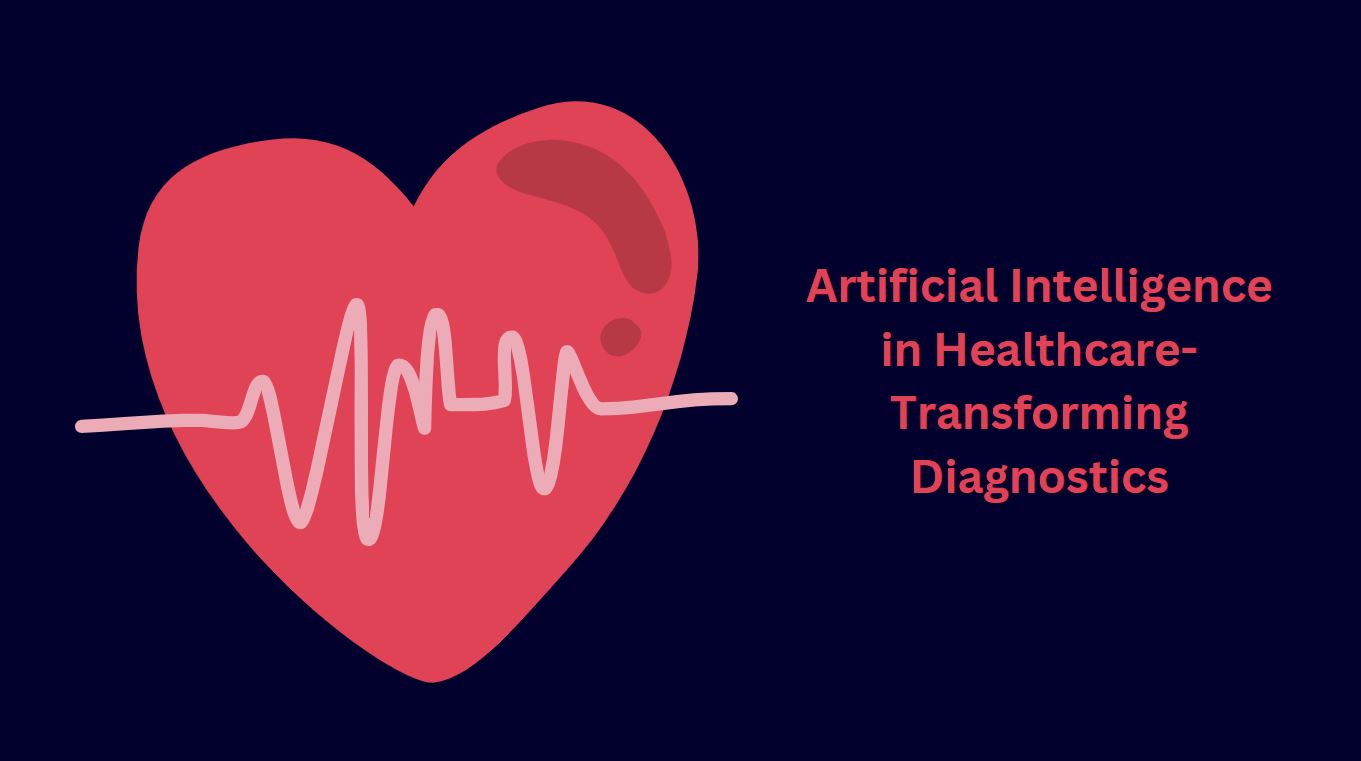- Likes
- Followers
- Followers
- Followers
- Subscribers
- Followers
- Members
- Followers
- Members
- Subscribers
- Subscribers
- Posts
- Comments
- Members
- Subscribe
Artificial Intelligence in Healthcare-Transforming Diagnostics

Artificial intelligence in healthcare has become a potent instrument in recent years, which is transforming several sectors in healthcare industry. It is redefining diagnosis which is one area where AI is making major progress toward more precise and effective health care. In this article, I’ll put some focus on how artificial intelligence (AI) is changing healthcare diagnostics and redefining how diseases are detected and cured, thus artificial intelligence changing lives of millions.
Impact of Artificial Intelligence in Healthcare
1. Early Disease Identification
Large volumes of medical data, such as test results, imaging scans, and patient records, can be analyzed by AI-powered diagnostic tools to find trends and abnormalities that might point to the existence of diseases. AI systems can identify early warning signs of diseases by utilizing machine learning algorithms. This enables medical professionals to take fast action and start the right method of treatment.
2. Enhanced Imaging and Diagnosis
Medical imaging is essential for the diagnosis of many diseases, including fractures and malignancies. Artificial intelligence (AI) systems have the ability to accurately evaluate medical images, including MRIs, CT scans, and X-rays. This helps radiologists identify abnormalities and make more accurate diagnoses. AI-based imaging solutions have the potential to improve patient outcomes by highlighting areas of concern, prioritizing urgent cases, and lowering the chance of human error.
3. Personalized Treatment Programs
Large-scale patient data sets, including genetic profiles, medical histories, and treatment results, can be analyzed by AI algorithms to create individualized treatment programs for each patient. AI-powered systems can suggest the best course of action for each patient based on their individual needs, taking into account factors like genetic predispositions, disease progression, and response to treatment. This leads to better treatment outcomes and increased patient satisfaction.
4. Predictive Analytics and Risk Stratification
Based on particular risk factors, AI systems can evaluate patient data to forecast the possibility of acquiring specific diseases or problems. Healthcare practitioners can reduce the likelihood of unfavorable outcomes by implementing interventions and preventive measures early on in the identification of high-risk patients. Predictive analytics powered by AI can also assist healthcare organizations select patient-centered interventions and more effectively distribute resources to those who will benefit from them.
5. Streamlined Workflow and Efficiency
By automating repetitive tasks like data input, documentation, and administrative procedures, AI-powered diagnostic technologies free up healthcare professionals to concentrate more on patient care. Artificial Intelligence (AI) technologies have the potential to enhance productivity in medical facilities, save healthcare costs, and streamline workflow by decreasing administrative burden.
Popular Artificial Intelligence Based Healthcare Tools
The healthcare sector is seeing a rise in the use of artificial intelligence (AI), which provides cutting-edge ways to boost diagnostic precision, optimize clinical operations, and improve patient care. You can find some of the most well-liked AI-powered medical technologies that are transforming the delivery of healthcare.
Posts You May Like
1. IBM Watson Health
IBM Watson Health is a comprehensive AI platform that helps medical practitioners diagnose conditions, find treatments, and forecast patient outcomes. It does this by utilizing machine learning algorithms and advanced analytics. The platform provides actionable insights and tailored suggestions for patient care by analyzing vast amounts of medical data, including genomic information, medical imaging, and electronic health records (EHRs).
2. Google Health
In order to provide cutting-edge healthcare solutions targeted at enhancing patient outcomes and streamlining clinical procedures, Google Health leverages AI and deep learning techniques. Google’s DeepMind Health is one noteworthy application that uses artificial intelligence (AI) to evaluate medical imaging data, identify anomalies, and help radiologists diagnose conditions like cancer and diabetic retinopathy.
3. GE Healthcare’s Edison Platform
Medical imaging equipment, diagnostic tools, and healthcare analytics solutions may all be integrated with GE Healthcare’s Edison platform, a potent AI-driven ecosystem. With the help of the platform, healthcare providers may use AI to increase patient care personalization, streamline workflow, and improve diagnostic accuracy.
4. NVIDIA Clara Healthcare
Healthcare businesses can create and implement AI-driven solutions for medical imaging, pathology, and genomics with the help of NVIDIA Clara Healthcare, an AI-powered platform that integrates powerful imaging technologies, data analytics, and deep learning algorithms. The platform gives medical practitioners the resources they need to create AI models more quickly, increase their capacity for diagnosis, and boost patient outcomes.
5. Zebra Medical Vision
Leading AI imaging analytics provider Zebra Medical Vision creates AI algorithms to evaluate data from medical imaging tests, such as CT scans, X-rays, and mammograms. Their AI-powered instruments let radiologists identify and diagnose a wide range of illnesses with remarkable efficiency and precision, including cancers, fractures, and cardiovascular disorders.
6. Cerner AI
Electronic health records (EHRs), clinical decision support systems, and population health management tools can all benefit from the AI-driven Cerner AI healthcare platform (https://www[dot]cerner[dot]com/). The platform uses artificial intelligence (AI) algorithms to evaluate patient data, spot trends, and give healthcare professionals useful insights so they can give patients personalized and efficient care.
These are only a handful of the several AI-based healthcare technologies that are revolutionizing patient outcomes, fostering innovation in the field, and changing the way healthcare is provided. We could expect even more revolutionary changes as AI develops in coming future, revolutionizing healthcare delivery and enabling healthcare professionals to provide patients with better, more individualized treatment.
Conclusion
In summary, early disease identification, improved imaging and diagnosis, customized medications, patient outcome prediction, workflow optimization, and efficiency enhancement are all made possible by artificial intelligence in healthcare, which is transforming diagnostics in the medical industry and increasing job and career opportunities in AI. With continued advancements, AI has the potential to revolutionize the diagnosis and treatment of diseases, improving patient outcomes and promoting a healthy society in the process.
Image credit- Canva


Comments are closed.